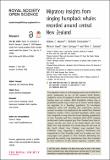Migratory insights from singing humpback whales recorded around central New Zealand
Abstract
The migration routes of wide-ranging species can be difficult to study, particularly at sea. In the western South Pacific, migratory routes of humpback whales between breeding and feeding areas are unclear. Male humpback whales sing a population-specific song, which can be used to match singers on migration to a breeding population. To investigate migratory routes and breeding area connections, passive acoustic recorders were deployed in the central New Zealand migratory corridor (2016); recorded humpback whale song was compared to song from the closest breeding populations of East Australia and New Caledonia (2015-2017). Singing northbound whales migrated past New Zealand from June to August via the east coast of the South Island and Cook Strait. Few song detections were made along the east coast of the North Island. New Zealand song matched New Caledonia song, suggesting a migratory destination, but connectivity to East Australia could not be ruled out. Two song types were present in New Zealand, illustrating the potential for easterly song transmission from East Australia to New Caledonia in this shared migratory corridor. This study enhances our understanding of western South Pacific humpback whale breeding population connectivity, and provides novel insights into the dynamic transmission of song culture.
Citation
Warren , V E , Constantine , R , Noad , M , Garrigue , C & Garland , E C 2020 , ' Migratory insights from singing humpback whales recorded around central New Zealand ' , Royal Society Open Science , vol. 7 , no. 11 , 201084 . https://doi.org/10.1098/rsos.201084
Publication
Royal Society Open Science
Status
Peer reviewed
ISSN
2054-5703Type
Journal article
Description
Funding: VEW is funded by a University of Auckland Doctoral Scholarship and the Woodside Marine Mammal Research Grant awarded by Woodside Energy. ECG is funded by a Royal Society University Research Fellowship.Collections
Items in the St Andrews Research Repository are protected by copyright, with all rights reserved, unless otherwise indicated.

